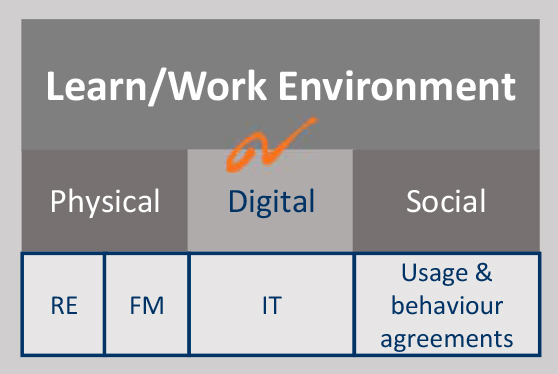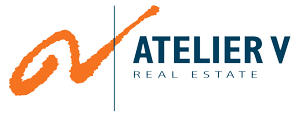The success of an organisation is usually not determined by the strength of an (accommodation) strategy, but by the extent to which the strategy is implemented, monitored and updated throughout the entire lifetime of the building.

Impact learn/work environment
The learn/work environment has a major impact on the people who use it. And with that also on the results of the process that those same people are working on. Therefore in addition to the attention to how people function and perform, there should also be a focus on the environment in which they must do so.
The environment (physical, digital, social) is a catalyst for people’s performance and well-being and therefore has a strategic impact. The management of the ecosystem of Bricks, Bytes & Behaviour enables steering the accommodation process from the integral organisational strategy.
As a result of this one can take control and create a managerial lever. The real estate/facility manager must know the factors that determine whether the accommodation will work for the organisation or not and thus help to decipher the code that leads to the desired experience and appearance. This is unknown territory for many real estate/facility managers.
The role of the real estate/facility manager is a supportive one in many organisations. A role in which often existing assumptions are fulfilled and not in which these assumptions are established. In an accommodation project, however, this supporting role is not sufficient. The real estate/facility manager must profile himself and be able to discuss organisational goals from operational to strategic level and translate these into learn/work environment consequences.
Uncertain times require organisations to make fast changes and continuous adjustments. A flexible organisation, with agile teams, has the power to steer itself onto the right course. Contemporary issues require an integrated approach that includes disciplines such as Real Estate, Facility Management, Information Technology and Human Resources. For that to happen dialogue and collaboration between the different discipline tribes are more than ever required. To become good discussion partners for each other, one has to learn to understand each other’s language and view of the learn/work environment. Access more diverse points of view and accelerate adaptation and a willingness to explore and experiment.
Integration of disciplines
The interaction and synergy between people and the physical, digital and social learn/work environment are intrinsically interconnected and form the cornerstone of Real Estate (RE), Facility Management (FM), Information Technology (IT) and Human Resources (HR). All these disciplines are complementary and (should) serve each other for the best experience and balanced well-being of the users. Integrating these disciplines strategically will release the untapped potential for enhancing performance and well-being. It brings benefits but also a responsibility and accountability to the people involved in it.
The pandemic may have forced us into new situations for working – but overall, every organisation has the ingredients required to become the breeding ground for effective and high-performing teams. Treat the pandemic as an opportunity to take a critical look at how you’ve been organised so far and how you can do things differently. Breaking out of the disciplinary boundaries and exploring and learning across and between the “silos” of real estate, facility management, information technology and human resources towards greater unity of knowledge. Crossing the tribe boundaries and learning to understand and speak each other’s language.
How can the integration of disciplines (RE, FM, IT) and human-centred (HRM) approaches be leveraged to create an optimal and purposeful learn/work environment ecosystem and improve customer service experiences? What are meaningful metrics to measure ecosystem performance?
We are in economically exceptional times. Stable environments can change in the blink of an eye. Creating organisations that move accordingly is vital to remain relevant. That said, uncertain times and situations like these require far-reaching decisions. Don’t maximize parts of systems or subsystems while ignoring the whole, whether this is easily measured or not and, especially in the short time, changes for the good of the whole may sometimes seem to be counter to the interests of a part of the system. It helps to remember that the parts of a system cannot survive without the whole.
The Covid-19 pandemic has taught us that the facility and the real estate management (FREM) discipline no longer has pre-eminence when it comes to employee workplace support. Mass working from home has made it explicit that Information Technology, Human Resources and Communication must work together as supporting disciplines in order to allow business processes to continue effectively.
Real Estate (RE) and Facility Management (FM) are critical secondary business processes. They require integration and consistency with other business processes such as Information Technology (IT), Human Resources, Finance, Procurement and the associated systems. A shift of focus towards the accommodation ecosystem of Bricks, Bytes and Behaviour. The environment generates behaviour and behaviour drives environment design and management.

As with any pending organisational advancement, scepticism abounds. Achieving these new ways of operating stands or falls with the efforts of employees and will require significant cultural change; requiring new skills and competencies, new measures and indices. Plus new ways of thinking about how the learn/work environment can actively support the effectiveness, safety, health and wellbeing of people. This will no longer be a trend or a nice-to-have, but a basic expectation.
If you put the teams in the lead, the teams and their managers begin jointly bearing the responsibility. With a common and clear goal, everyone does their best to help each other move forward. They not only push each other to be better, but they also dare to talk openly about things that can be done better. Together, as an (interdisciplinary) team and as individuals, they become the best versions of themselves.
To make interdisciplinary teams work means that people from the various disciples are more committed to solving the problem than to being academically correct. They will have to go into learning mode, to admit ignorance and be willing to be taught, by each other and by the system.
The personal development of employees also deserves attention – when there is no room for personal growth, the team cannot grow beyond a point. Improve at the employee, team and organisational levels.
“Education is not filling a bucket but lighting a fire.” (W.B. Yeats)
As an organisation, dare to think big, but start small and expand incrementally. Without experimentation, innovation is impossible. Experiment and gradually find out which form and speed of implementation suit the organisation best. Have faith in the process. Like anything new, it takes a bit of trial and error before you get it right, but the payoff is worth it.
ATELIER V supports the design and training of the Real Estate (RE) / Facility Management (FM) departments to Accommodation Manager 3.0, which focuses on people as users of the learn/work environment. The method used will give you a grip on your accommodation. Transform your people into a world-class team by mapping the current situation to find out areas for improvement that matter.
- What situations do people find difficult?
- What exactly do they do in these situations?
- What effect does their behaviour have in these situations?
- What tricky situations come up the most?
- What situations don’t come up so often but have a major negative impact?
Seven Success Factors for FREM
Facility Real Estate Management
- #01 Business-like thinking is essential to understand the (internal) client.
- #02 Breaking down silos and working together in coordination instead of competing with each other.
- #03 Understand the primary business process and the impact of (poor) learn/work environment performance on it.
- #04 Talk about the learn/work environment in the language of the business.
- #05 Identify opportunities and risks and understand the effects of the learn/work environment data on the business.
- #06 Communicate the main contribution of the learn/work environment to the strategic intent and objectives.
- #07 FREM’s natural partner to align the learn/work environment to the strategic objectives, besides the IT department, is the Human Resources department.
Accommodation management 3.0
The primary focus of the accommodation manager on building-centric inputs (1.0) like technical maintenance, compliance with legislation and regulations and safety has already shifted through to service outputs (2.0). An integrated approach, which, in addition to technical maintenance, adds on the portfolio strategy, the programs like e.g. sustainability, smart campus and the wishes/requirements of the users. It also takes into account more grip and control over (financial) operations.
The next level is a greater concentration on people-centric outcomes (3.0). It adds the wishes/requirements of the users. User experience and user satisfaction will be seen as much about the physical and digital environment in which the hard and soft services are delivered as the service itself. It ensures the added value of the learn/work environment for education and research, the primary processes. It leads to more efficient and effective business operations and engagement of the users and improves manageability and governance.

An Accommodation Management 3.0 approach puts people as a user of the learn/work environment central and helps prevent that the ‘wrong’ things are done very efficiently that do not or hardly contribute to the effectiveness for the own organisation and the experience of the users.
A 3.0 approach pays in addition to technical and cost management, attention to indirectly reducing costs and creating value (increasing benefits) in the primary process with the learn/work environment.
The mindset will change to one of user-orientated delivery culture, where RE, FM, IT and HR teams need to understand the value drivers and expectations. Providing a tangible difference with the evidence of how to create user value.
The ultimate test of the effectiveness of a learn/work environment is the experience of those who use it. In addition to the (subjective) opinion of the users, there is also a need for an objective assessment of the actual performance of the learn/work environment.
For example, it can be assessed whether the intended effect of the accommodation is being realized in an efficient manner on time, within acceptable risks and budget. It helps to make the quality of the learn/work environment (RE, FM, IT, HR) SMARTI so that it can be managed to achieve, monitor and safeguard the desired user satisfaction and experience with the PDCA cycle in addition to effectiveness and efficiency.
This approach is an integrated part of the ATELIER V Real Estate GPS, a navigator to determine the current position in relation to the strategic organisational goals. More information or an informal conversation? Contact us by Email, we are happy to serve you.
